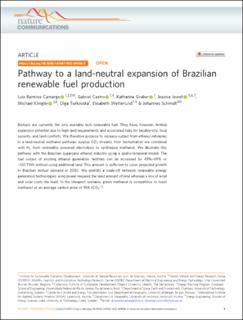Pathway to a land-neutral expansion of Brazilian renewable fuel production
Ramirez Camargo, Luis; Castro, Gabriel; Gruber, Katharina; Jewell, Jessica; Klingler, Michael; Turkovska, Olga; Wetterlund, Elisabeth; Schmidt, Johannes
Journal article, Peer reviewed
Published version

Åpne
Permanent lenke
https://hdl.handle.net/11250/3060759Utgivelsesdato
2022Metadata
Vis full innførselSamlinger
- Department of Geography [627]
- Registrations from Cristin [9489]
Sammendrag
Biofuels are currently the only available bulk renewable fuel. They have, however, limited expansion potential due to high land requirements and associated risks for biodiversity, food security, and land conflicts. We therefore propose to increase output from ethanol refineries in a land-neutral methanol pathway: surplus CO2-streams from fermentation are combined with H2 from renewably powered electrolysis to synthesize methanol. We illustrate this pathway with the Brazilian sugarcane ethanol industry using a spatio-temporal model. The fuel output of existing ethanol generation facilities can be increased by 43%–49% or ~100 TWh without using additional land. This amount is sufficient to cover projected growth in Brazilian biofuel demand in 2030. We identify a trade-off between renewable energy generation technologies: wind power requires the least amount of land whereas a mix of wind and solar costs the least. In the cheapest scenario, green methanol is competitive to fossil methanol at an average carbon price of 95€ tCO2−1.
